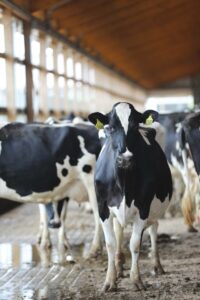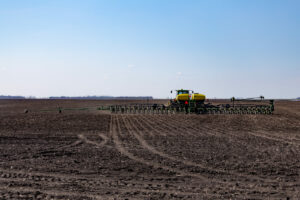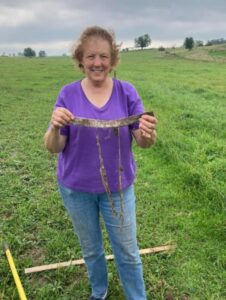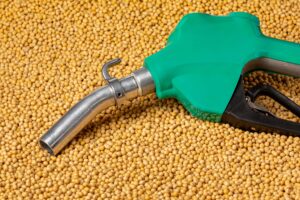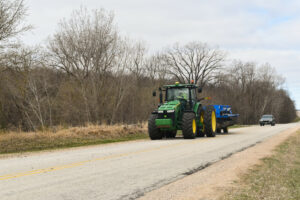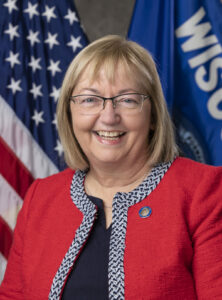Insight Into Dairy Swing
Cheese and Class III milk prices rallied to start the week. John Heinberg, market advisor with Total Farm Marketing in West Bend, says multiple factors were at play.
Heinberg explains the big rally had to do with heightened cheese demand, the stats in the latest milk production report, and lower cow numbers.
“We’re basically 71,000 head down from last year at 8.8 million head, so that combination of things has tightened up the supply chain here,” he says. “The milk market is extremely volatile and I think we’re trying to find a middle point here… it’s an opportunity for producers to get some prices locked in here.”
In the latest milk production report from USDA’s National Agricultural Statistic Service, only seven of the 24 major dairy-producing states saw production rise. Milk production in those 24 states during March totaled 18.8 billion pounds, down 0.9 percent from March 2023. The number of milk cows on those farms was 8.88 million head, 71,000 head less than March 2023, and 7,000 head less than February 2024. Production per cow averaged 2,115 pounds, 3 pounds below March 2023.
Heinberg says the story behind the cheese rally starts before the latest milk production report. He says the news that dairy cattle are contracting the Highly Pathogenic Avian Influenza brought the market down “cheaper than it needed to go” and when the price was right, demand picked up.
“Low prices cure low prices sometimes,” he says. “We saw a nice 30-cent rally in the cheese side of the equation and that’s just helped pull this milk price right back up.”
The Class III milk prices have not held on to the higher moves into mid-week. Cheese is holding steady so far.
Wisconsin Sees More Field Activity
Wet and cool conditions delayed significant row crop planting in most of the state but southern Wisconsin did see some scattered corn and soybean planting.
The latest progress report from the National Agricultural Statistics Service says farmers got to other field activities as conditions allowed, such as spring tillage, readying equipment, alfalfa planting, potato planting, oat seeding, manure hauling, and fertilizer application.
Topsoil moisture condition rated 5 percent very short, 16 percent short, 69 percent adequate, and 10 percent surplus. Subsoil moisture condition rated 5 percent very short, 23 percent short, 64 percent adequate, and 8 percent surplus.
Oat planting progress was 19 percent complete, five days ahead of last year and a day ahead of the 5-year average. Emergence has begun and was 7 percent complete.
Potato planting was 25 percent complete. This was a week ahead of last year and five days ahead of average.
Spring tillage was 22 percent complete, nine days ahead of last year and three days ahead of average.
Winter wheat condition rated 82 percent good to excellent statewide, up 4 percentage points from last week.
Pasture and range condition rated 37 percent good to excellent statewide, up 5 percentage points from last week.
FarmFirst Dairy Cooperative Appoints New GM
FarmFirst Dairy Cooperative proudly announces Mick Homb as the newly appointed General Manager, bringing expertise and a proven track record to lead the cooperative into its next chapter of growth and success.
Having served as the Director of Milk Marketing for the cooperative’s Family Dairies USA division since 2019, Homb has demonstrated exceptional leadership and management within the cooperative. His responsibilities have encompassed managing a dynamic milk hauling schedule, navigating diverse buyer relationships amidst seasonal fluctuations, and ensuring compliance with stringent federal regulations, all while overseeing crucial aspects such as milk producer payroll and the coordination of milk haulers.
“Mick’s demonstrated success and extensive management experience within the dairy food industry make him the natural choice to lead our cooperative,” says FarmFirst Board President John Rettler. “We are excited about the positive direction he will lead us in and look forward to the invaluable contributions he will make to our organization.”
In his new role as general manager, Mick Homb will assume leadership over FarmFirst Dairy Cooperative, spearheading the management of its divisions and programs while concurrently continuing his pivotal role in milk marketing for the Family Dairies USA division.
Prior to joining FarmFirst and Family Dairies USA, Homb worked as a production manager at Dean Foods, where he oversaw scheduling for an entire processing plant, including fluid milk bottling, cheesemaking, and sour cream production. He also provided efficiencies in schedules, managed payroll for his employees, and handled labor negotiations.
Egg Production Up 4 Percent
Wisconsin egg production during March 2024 was 207 million eggs, up 4 percent from the previous March, according to the latest Chickens and Eggs report from the USDA’s National Agricultural
Statistics Service.
U.S. egg production totaled 9.29 billion during March, up 1 percent from last year.
The average number of all layers on hand in Wisconsin during March was 7.81 million, up 2 percent from last year. Eggs per 100 layers for March was 2,650, up 2 percent from a year ago.
In the U.S., the average number of layers totaled 379 million, down 1 percent from last year. March egg production per 100 layers was 2,455 eggs, up 2 percent from March 2023.

River Falls Farmers Win “Soil Your Undies” Contest
The Soil Your Undies contest combines crude humor and crude science to help farmers see how the management choices they make impact the soil they work in. For two years now, local farmers and landowners have been burying extra large pairs of Hanes underwear, with the help of local Farmer-Led Watershed Councils, in a friendly competition to see how well their soil breaks down cotton. In just 2 months, healthy soils can completely demolish a pair of tighty whities, whereas briefs “planted” in unhealthy soils often don’t show much decay.
Measuring the decay of the cotton in underwear provides a rough measurement of soil health. This is because decay happens as the microbes and critters in the soil break down organic materials. Unhealthy, compacted, or “dead” soils usually don’t possess those microbes that also help the roots of crops to recycle nutrients, maintain soil structure for water retention, and reduce compaction to help roots grow more easily.
Liz & Randy Mittag
This year’s winners of the Soil Your Undies challenge are Liz and Randy Mittag of Shadow Ridge Ranch. The Mittags run a beef farm in River Falls that aims to raise cattle in a way that helps the land and connects the community to their food. Their cattle are rotationally grazed. This means they move through pastures often enough that each pasture has time to rest and rejuvenate before seeing livestock again. By pasture-feeding cattle, the Mittags are protecting land that would otherwise be in row cropped fields losing more soil and nutrients to local streams and lakes and providing habitat for birds and pollinators alongside their Herefords.
“The underwear contest is great fun and it brings camaraderie to ranchers and farmers in a playful competition. We’ve been doing rotational grazing and we knew our soils were doing better with the changes we’ve made, but it was really fun to see it compared to other fields,” said Randy Mittag. Alongside bragging rights, the couple now have a trophy of a miniature pair of underwear. They also provided the beef served for dinner that evening. The Mittags are always excited to see more farmers integrate rotational grazing and beef onto their own farms. “If there’s anyone interested in this type of stuff, Liz and I are always willing to lend a hand and show them what we’ve learned.”

Platteville Ag Graduates Are Finding Success
With graduation just around the corner, the University of Wisconsin-Platteville School of Agriculture is buzzing with anticipation and celebration as students prepare to embark on their next adventures in the agricultural industry.
Amidst the final exams and job interviews, the job market for these grads is looking good. According to Platteville’s School of Agriculture Director, Tera Montgomery, there has been a noticeable trend of interest from both employers and students in the field of Agronomy. There has also been interest in areas related to sustainability practices, particularly in business applications such as carbon credits. The school has also witnessed a rise in students exploring interdisciplinary opportunities. They have been combining agricultural studies with fields like communication, marketing, business, and engineering
“The intersection of agriculture with other disciplines is becoming increasingly appealing to our students. We’re seeing more engagement from students who want to broaden their skill sets and explore diverse career paths within the agricultural industry.”
There is a growing demand for graduates within the agricultural industry, surpassing the current supply of qualified candidates.
“Our students are well-prepared for the workforce. That’s thanks to hands-on experiences gained through internships and a strong emphasis on networking skills. Employers seek out graduates who not only possess technical expertise but also excel in communication and relationship-building.”
Graduates of the School of Agriculture are in high demand, with approximately 80% securing employment before graduation. Companies across the agricultural sector value the practical skills and industry knowledge that students acquire during their time at UW-Platteville. Many graduates are drawn to positions that allow them to make a meaningful impact on farming communities. They’re also prioritizing jobs where they can contribute to agricultural innovation.
“While the majority of our graduates choose to remain in the tri-state area, some are venturing further afield to gain diverse experiences before returning to their hometowns. The COVID-19 pandemic has underscored the importance of family and community ties for many students. This has influenced their decisions about job locations.”
WBFA Supports Emergency E15 Waiver
The President of the Wisconsin BioFuels Association, Erik Hushitt, made the following statement regarding the emergency fuel waiver issued on Friday by the Biden Administration:
“We commend President Biden and EPA Administrator Michael Regan for issuing the emergency fuel waiver allowing year-round sales of E15. This decision saves consumers money, cuts emissions, and ensures a stable fuel supply. It’s noteworthy that Governor Evers and 7 other midwest Governors played a pivotal role in securing year-round E15 sales, granted in February, though it won’t take effect until 2025. This waiver provides immediate relief for this year’s consumers, and demonstrates that a permanent legislative solution is crucial for long-term benefits.”
WBFA is glad that those at the federal level understand the importance of reducing summertime air
pollution. This reassurance underscores the benefits of E15 for both consumers and the environment
year-round in Wisconsin and across the country.
Five Tips for Spring Rural Road Safety
As days get warmer, the itch to hit the field gets stronger. It’s springtime in Wisconsin, which means planting season is getting underway for farmers across the state.
Traveling with agricultural equipment on the road poses an increased hazard that is often a dreaded part of farming. It is critical that farmers ensure their vehicles meet legal requirements and operate safely while sharing roadways with their fellow motorists.
“Everyone is busy – and during the busy seasons, it’s easy to get impatient with farmers on the road,” said Wisconsin Farm Bureau President Brad Olson. “Staying vigilant and patient on the roadway is a responsibility all motorists share. At the end of a long hard day, we all want to make it home safe to our families.”
Commit to staying safe on the road this spring with these five mindful tips:
Make Smart Decisions
Follow safe, smart driving practices at all times. Before attempting to pass in a no-passing zone, know that is illegal to pass an IOH including farm tractors and farm machinery or an agricultural commercial motor vehicle (Ag CMV).
Motorists should wait to pass a slow-moving vehicle until they have safely entered a passing zone. Farmers should not pull over in a no-passing zone to let vehicles pass unless the road shoulder condition and width can allow for the farm machinery to completely move onto the shoulder.
Farmers also should not wave a driver forward to pass. While these actions seem courteous, it sends mixed signals and is not encouraged. In a passing zone, or if the shoulder width permits, farmers are obligated to yield the roadway to an overtaking vehicle so they do not impede the normal movement of traffic.
Be Alert
Stay alert while driving, as you never know when you’ll meet farm equipment on the road.
The Wisconsin Department of Transportation recommends that motorists should slow down immediately whenever they see a slow-moving vehicle emblem (orange and red triangle) on the rear of a tractor or other piece of equipment. This emblem indicates that the farm machine usually travels slower than 25 mph. Stay alert, focused and patient when passing a slow-moving agricultural vehicle in an area where passing is legal.
Watch Out
Watch out for unexpected turns into field driveway, as it is more likely for farm equipment to turn there than at an intersection. It can turn into a dangerous situation when a farmer is attempting to make a left-hand turn. Farm equipment, especially the tractor, will have two flashing amber or yellow lights on the cab or tire fenders of the tractor when on the roadway. When a farmer signals to turn, the light will continue to flash in the direction the farmer is turning. The other light will go solid.
Farmers are asked to comply with the proper lighting and marking requirements to draw attention to the size, shape and speed of agricultural vehicles and to alert motorists that caution is required. There are specific requirements for different types of equipment. This information can be found here.
Leave Space
When a motorist legally passes large farm equipment within a short distance of a controlled intersection (stop sign or stop lights), this action can dramatically impact the reaction time and braking distance for the farmer. Farm equipment is heavier than a passenger vehicle, which makes it critical to have adequate braking distance.
Don’t Assume
Don’t assume that because you can see the farmer that they can see you. Blind spots are common on farm equipment. Accident risks are highest when equipment is backing up or moving in an area with limited space or turn radiuses.
“Safe roads not only protect lives but also support the long-term viability of farms and rural communities. It is about fostering a culture of shared responsibility for the well-being of our communities,” added Olson.
UWRF Receives Gold Sustainability Rating
From helping stage Earth Fest in conjunction with Earth Day, to creating a bee hotel and a surrounding pollinator-friendly garden, the University of Wisconsin-River Falls Sustainability Office and partners have taken an increasingly active role on campus and in the surrounding community.
Those efforts are reflected in a newly released rating in which the UWRF sustainability program has received a STARS Gold rating in recognition of its sustainability achievements from the Association for the Advancement of Sustainability in Higher Education (AASHE).
STARS
STARS (Sustainability Tracking, Assessment & Rating System) measures and encourages sustainability in all aspects of higher education. Ratings are awarded in Reporter, Bronze, Silver, Gold and Platinum levels, with Platinum the highest.
The current STARS report rating is the highest that UWRF has achieved. It is a measure of the commitment to integrating sustainability into as many aspects of campus operations and those of the River Falls area as possible, Sustainability Coordinator Mark Klapatch-Mathias said. The award’s official announcement on Earth Day is especially fitting, he said.
“I am extremely proud of the Gold rating because it shows the improvements we continue to make in ensuring that sustainability is a larger part of our everyday life here at UWRF and in the surrounding community,” Klapatch-Mathias said. “The students involved in our Sustainability Office have worked hard to increase sustainability practices in many ways. This rating would not be possible without their diligent efforts.”
UWRF completes a STARS report every three years and previously attained a Silver rating in 2021. It is the only Universities of Wisconsin school with a current Gold rating. The full UWRF STARS report can be found here. An abbreviated executive summary highlighting accomplishments and opportunities can be found here.
With more than 900 participants in 40 countries, AASHE’s STARS program is the most widely recognized rating system in the world for publicly reporting comprehensive information about a college or university’s sustainability performance. Participants report achievements in five overall areas: academics, engagement, operations, planning and administration, and innovation and leadership.
Sustainability Progress
A key move that boosted sustainability progress was adding it as a core value at UWRF and making it part of the university’s strategic plan. That has helped garner more support for and engagement with sustainability initiatives from across campus, Klapatch-Mathias said.
UWRF scored high in the STARS Report in multiple areas, such as incorporating sustainability into the curriculum and engaging campus and the surrounding community. Bonus points were received for such sustainability practices as having designations for Fair Trade Campus and Bee Campus.
Chancellor Maria Gallo said the university’s Gold rating is a sign of the strong commitment by faculty, staff and students at UW-River Falls to incorporating sustainable practices on campus.
“Sustainability is one of UWRF’s core values and is prominent in both the academic and strategic plans,” Gallo said. “Achieving a Gold rating and our highest score to date is an incredible accomplishment and a true demonstration of what is possible when priorities are set and the entire campus community aligns their efforts.”
Ballweg’s Bill Supporting Local Fairs Signed
Senator Joan Ballweg’s bill to aid county and district fairs was signed by Governor Evers. 2023 Wisconsin Act 244 adds to the 27 bills authored by Senator Ballweg that have been signed this session.
“I am happy to have Senate Bill 311 signed into law,” said Ballweg. “This legislation builds on my work to support local fairs. I met with these organizations last session, and provided funding for this program in the 2023-25 Wisconsin State Budget. I think it is important to invest in our local fairs because they promote agriculture and community involvement.”
Senate Bill 311 prohibits the Department of Agriculture, Trade and Consumer Protection (DATCP) from restricting the number of fairs an exhibitor may participate in and increases the state aided premium. This ensures fairs receive enough aid to cover their costs. This legislation was necessary after a rule was promulgated by DATCP in the 2021-23 legislative session that would have restricted the number of fairs in which an exhibitor may participate.
This proposal received bipartisan support and the bill will go into effect for this upcoming fair season.

